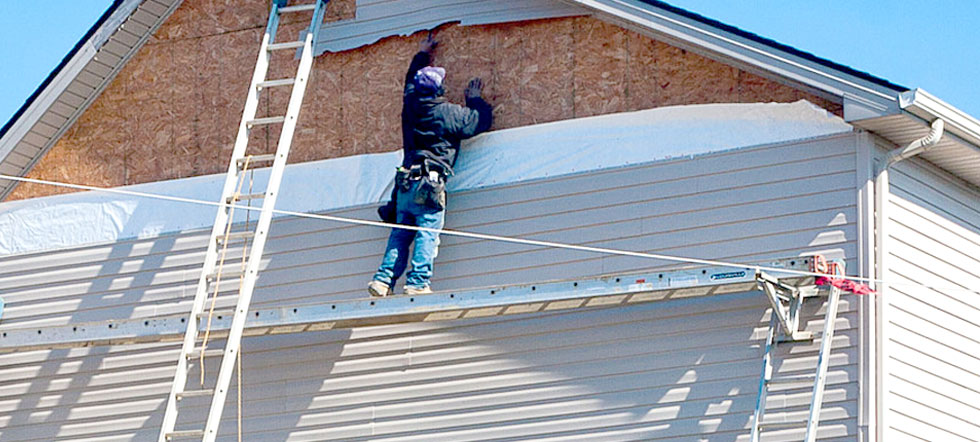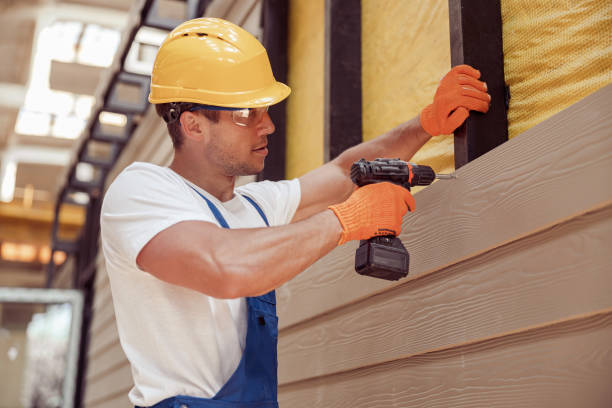Morris Siding Contractor Committed to Excellence in Every Project
Morris Siding Contractor Committed to Excellence in Every Project
Blog Article
The Crucial Guide to the Numerous Types of Siding and Their Special Benefits
In the world of home renovation, selecting the ideal exterior siding is an essential choice that impacts both visual allure and functional performance. With so lots of choices to think about, which house siding material absolutely stands out for your certain task?
Wood Siding
Timber house siding, a popular choice for residential outsides, provides a timeless visual that incorporates all-natural charm with architectural stability. This house siding product is available in various designs, including clapboard, shingles, and board-and-batten, permitting home owners to tailor their façade to match their style choices. Timber exterior siding is commonly crafted from long lasting species such as cedar, redwood, or ache, which are recognized for their durability and capacity to hold up against environmental stressors.
Among the main benefits of wood siding is its excellent insulation buildings, which can add to energy efficiency and lower heating prices. In addition, wood siding is naturally degradable, making it an eco-friendly option when sourced sustainably. Routine maintenance, including paint or staining, can extend its life-span and improve its look, allowing home owners to preserve the all-natural appeal of the timber.
Nevertheless, prospective downsides include vulnerability to pests, rot, and weather condition damages, requiring appropriate therapy and maintenance - morris siding contractor. In spite of these problems, when correctly looked after, wood exterior siding can provide a attractive and sturdy service that enhances the personality of a home while supplying a cozy, inviting atmosphere

Plastic House Siding
Vinyl siding has actually emerged as a leading choice for home owners seeking a low-maintenance outside choice that combines durability and price. This versatile product is crafted from polyvinyl chloride (PVC), making it resistant to different climate condition, including moisture and UV rays. As an outcome, vinyl house siding does not warp, rot, or fade, making certain lasting visual appeal.
One of the main benefits of vinyl house siding is its comprehensive array of styles and colors, permitting property owners to attain the desired search for their home without the requirement for frequent repainting. Furthermore, plastic siding is simple to mount, which can significantly decrease labor prices during building or improvement jobs.
Vinyl home siding also adds to energy effectiveness. Many choices attribute insulation support, which boosts thermal performance, helping to preserve comfortable indoor temperatures and potentially reducing power expenses. In addition, its smooth surface area facilitates easy cleaning, requiring just routine cleaning with a yard hose to eliminate dirt and debris.
Fiber Cement Home Siding
Fiber cement home siding has actually gotten grip among property owners and building contractors alike as a result of its impressive mix of longevity and visual versatility. Made up of a blend of concrete, sand, and cellulose fibers, this exterior siding option is crafted to hold up against extreme weather problems, including high winds, heavy rainfall, and temperature variations, making it a durable selection for domestic exteriors.

One of the main benefits of fiber cement house siding is its resistance to pests, such as termites, and its non-combustible nature, offering enhanced fire security. morris siding contractor. Furthermore, it is offered in a wide selection of designs, colors, and structures, permitting home owners to achieve their preferred visual without sacrificing efficiency
An additional advantage is its low upkeep requirements; fiber cement siding normally requires painting or staining every 5-10 years, which is less regular than various other products. Furthermore, its longevity adds to a reduced total cost of possession, as it lowers the need for frequent repair services or substitutes.
Ultimately, fiber cement home siding stands for an excellent financial investment for those looking for a resilient, appealing, and functional exterior option, combining both form and function to enhance the home's curb charm.
Metal Home Siding
The attraction of steel home siding hinges on its durable sturdiness and modern aesthetic appeal, making it a favored selection for modern design. Offered in products such as light weight aluminum and steel, steel house siding supplies a variety of coatings and shades, enabling property owners to achieve a tailored visit this web-site look that enhances their layout vision.

Energy effectiveness is another substantial benefit, as many metal home siding items are made with insulation alternatives that aid manage interior temperature levels. This can bring about decreased power costs over time. Furthermore, steel home siding is often recyclable, making it an environmentally friendly choice for sustainability-minded property owners.
The setup process for steel house siding can be reasonably uncomplicated, causing a quicker turn-around time for building projects. Overall, steel house siding integrates performance and style, making it a practical option for those looking for a aesthetically appealing and long-lasting outside surface.
Brick and Rock House Siding
Brick and stone house siding attracts attention as a classic option that enhances the visual appeal of any home. Recognized for their longevity and low maintenance, these materials provide a remarkable roi while raising the property's visual appeal. Readily available in different colors, textures, and patterns, block and stone can be customized to suit varied architectural designs, from standard to modern.
Among the primary advantages of block and stone home siding is their energy efficiency. Both products have natural protecting homes that aid regulate indoor temperatures, possibly reducing cooling and heating expenses. In addition, they offer remarkable fire resistance contrasted to other home siding alternatives, adding to enhanced safety.
An additional advantage is their long life. Brick and stone can last for years, often requiring minimal upkeep beyond periodic cleansing. Unlike timber house siding, they are resistant to pests and rot, guaranteeing a resilient outside that holds up against the components.
Conclusion
In summary, the selection of house siding substantially affects a home's aesthetic charm, power efficiency, and maintenance demands. Each kind of house siding-- whether timber, vinyl, fiber steel, cement, or block and rock-- offers one-of-a-kind advantages customized to different property owner choices and ecological conditions.
One of the key benefits of timber home siding is its excellent insulation residential properties, which can contribute to energy performance and lower home heating expenses. In addition, wood house siding her comment is here is biodegradable, making it an ecologically pleasant option when sourced sustainably.One of the main advantages of steel home siding is its resistance to numerous environmental aspects.Power efficiency is another considerable benefit, as many metal house siding products are developed with insulation alternatives that aid regulate indoor temperatures. Each type of home siding-- whether timber, vinyl, great site fiber concrete, block, or metal and rock-- provides special advantages customized to numerous homeowner choices and ecological problems.
Report this page